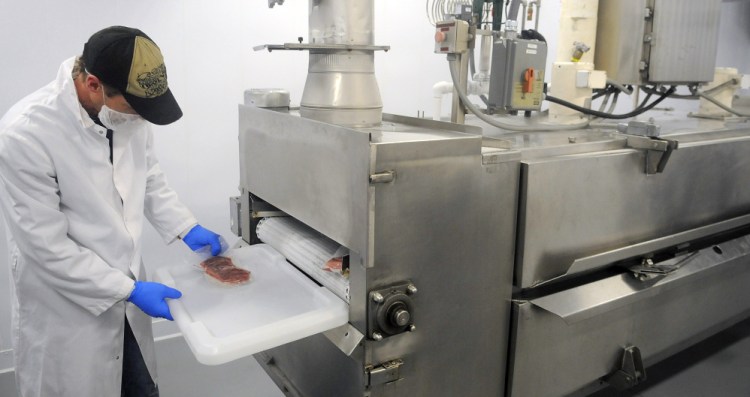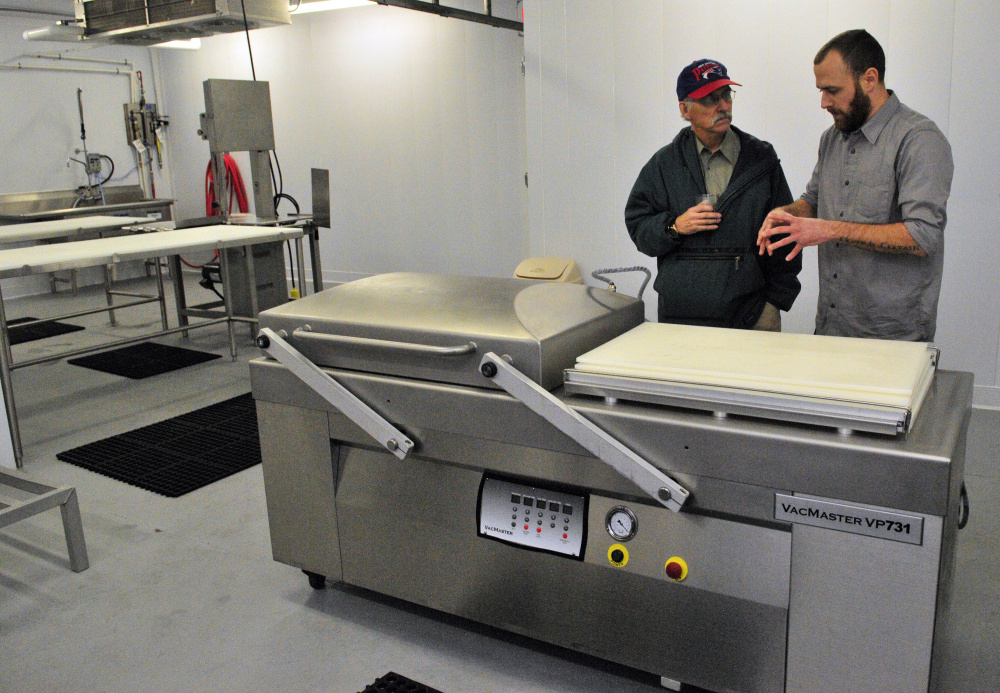Joel Davis was enjoying his retirement from a long career in financial management when a friend asked him to help out a guy in Gardiner. The guy, Bill Lovely, was trying to open a USDA-approved meat processing plant, but he needed help with some of the financing. How hard could that be? Davis said yes.
Eighteen months later and Davis can talk flash freezers, animal welfare and third-party auditors with the best of them. And he’s still not done; in fact, now he’s a co-owner and managing director of Central Maine Meats, the first new USDA-inspected meat processing and packing facility to open in Maine in years. (Davis believes 25 years; because of complications in record keeping, USDA can’t confirm it).
“It has been a learning experience,” Davis said, laughing. “I thought I would get in there, rustle it up and get out in a few months.”
But when food safety regulations are concerned, there are, as Davis puts it, “a lot of hoops,” and he has been through them. Almost. Central Maine Meats, the winner of the Source Newcomer Award, is fully inspected by the USDA and open for business, although at this point operating at only about 20 percent of capacity.
Davis said yes because he knew enough about the local food movement to know that there was a need for more slaughterhouses and butchers to prepare Maine-raised beef, pigs and lamb for retail sale. It’s been on the wish list of just about every group advocating for local foods, including the Maine Sustainable Agricultural Society, which started a side project aptly called More Maine Meat. In a survey for the group, conducted by the University of Maine Cooperative Extension, 61 percent of producers said that the lack of processor availability was a barrier to growth.
“It’s not what a lot of people like to talk about, but it is central to our ability to have a truly sustainable animal protein source here in Maine,” said Gardiner City Manager Patrick Wright, who nominated Central Maine Meats for the newcomer award.
There are seven state-inspected processing facilities in Maine and, counting Central Maine Meats, six USDA-inspected processors. Getting the USDA stamp of approval is a necessity for anyone who wants to sell his meat or poultry across state lines.
But for some producers, that’s not enough. Lisa Webster of North Star Farm, who with her husband, Phil, raises legendarily good lamb, has been taking her animals to Vermont every week to be processed because the retailers she deals with ask for not just a USDA-approval seal, but proof of a third-party audit of the processing plant.
She requires evidence of humane treatment (Central Maine Meats earned an Animal Welfare Approved certification, which adheres to animal rights advocate Temple Grandin’s standards for slaughter). Finally, she needs to take her animals somewhere equipped with digital scales to package the meat correctly for retail sale and where she can trust the cutters to maximize the meat from each animal. She’s been selling her meat as a whole animal to retailers like Rosemont that have the expertise to break it down, but she wants the flexibility to sell in more outlets. Central Maine Meats can do that for her. And by being there, allow her to grow her business. And not just a little.
“Tenfold,” she said.
“Finally Maine is actually going to be leading with a modernized plant that can get the product into the warehouses in a way that can be recognized by the Syscos and Aramarks of the world,” Webster said, referring to two of the biggest food service distributors. “The big guys can really start to look at Maine (as a food source).”
And perhaps even Gardiner as a food hub. That’s Davis’ hope. He and Lovely already have 23 employees, including four butchers and a dedicated food safety officer, and he hopes their business draws others into town (a new food co-op opened recently downtown). Eventually, he looks forward to retiring again.
But first he wants to get Central Maine Meats’ new high-tech, fast-action smoker up and running.
Send questions/comments to the editors.




